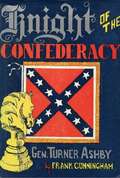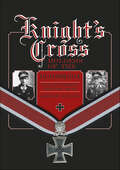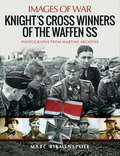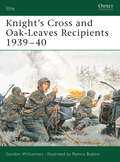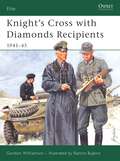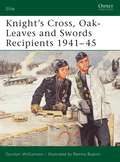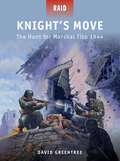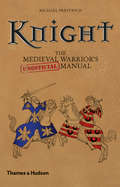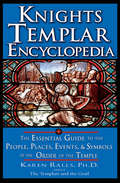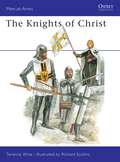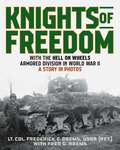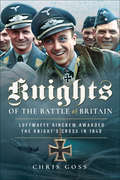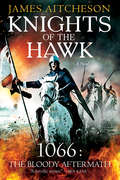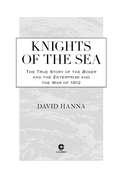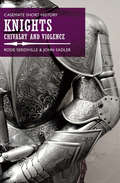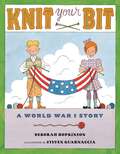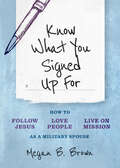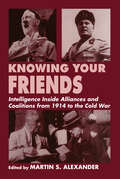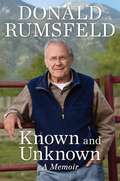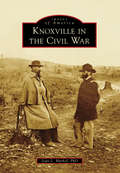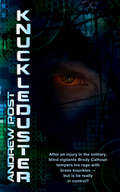- Table View
- List View
Knight of the Confederacy: Gen. Turner Ashby
by Dr Frank CunninghamFrom the pen of versatile Frank Cunningham, who wrote the dynamic history of General Stand Watie's Confederate Indians, comes another stirring book on heroic phases of the Civil War. Brilliantly written, highly researched--this is the biography of a cavalry general of top significance, proud of his men and his capable horse artillery. Recreated within these pages is the vibrant figure of Turner Ashby, astride his milk-white steed, dashing across the fields and hills of Virginia--now fearless and bold--now gallant and courteous-a man revered by his own people, respected by the enemy.Turner Ashby, born October 23, 1828, of an aristocratic Virginia family at Rosebank Plantation, Fauquier County, was descended from an English family of nobility, members of which had earned fame on other fields of battle. His father was Colonel Turner Ashby, who distinguished himself during the War of 1812. His brothers, James and Richard, served the South and all three men went to their deaths for the Cause in which they believed.Ashby, forsaking home and loved ones, put the ideal of Freedom from oppression uppermost in his mind with the thought that to die "upon the altar of (his) country" for one's beliefs was paramount.Illustrated throughout with plates, including portraits.
Knight's Cross Holders of the Fallschirmjager: Hitler’s Elite Parachute Force at War, 1940-1945
by Jeremy DixonMini-biographies of the 130 Knight&’s Cross Holders of the Fallschirmjäger, Hitler&’s elite paratroopers
Knight's Cross Panzers (Stackpole Military History Series)
by Hans Schaufler• First time in English• Unit history of a tank regiment on the Eastern Front• Relies on firsthand accounts, after-action reports, letters, diaries, and newspapersJoin the German soldiers of the 35th Tank Regiment as they drive their tanks into battle from the beginning of World War II to the very end. As part of the 4th Panzer Division, the regiment invaded Poland in 1939, France in 1940, and Russia in 1941. It spent the rest of the war on the Eastern Front, fighting in bloody battles at Orel and Kursk and surrendering in Lithuania.
Knight's Cross Winners of the Waffen SS (Images of War)
by Marc RikmenspoelA pictorial overview of recipients of Nazi Germany’s military award for bravery.Knight’s Cross Winners of the Waffen-SS details some of the most-decorated personalities of that infamous organization. Rare photos, including a mix of studio portraits and shots taken in the field, portray prominent members of the SS’s military branch during World War II including Sepp Dietrich, who went from serving as Adolf Hitler’s driver and bodyguard to being elected to the Reichstag; Dachau commandant Theodor Eicke; and tank commander Michael Wittmann.
Knight's Cross and Oak-Leaves Recipients 1939-40
by Ramiro Bujeiro Gordon WilliamsonOsprey's survey of the recipients of the Knight's Cross and Oak-Leaves awards during World War II (1939-1945). In 1939 a new grade in the Iron Cross series was introduced, the Knight's Cross of the Iron Cross (Ritterkreuz des Eisernen Kreuzes). It was awarded for a variety of reasons, from skilled leadership to a single act of extreme gallantry, and was bestowed across all ranks, grades, and branches of service. As the war progresed, further distinctions were created for bestowal on existing winners, namely Oak-Leaves (Eichenlaub); Oak-Leaves with Swords (Eichenlaub und Schwertern); and Oak-Leaves with Swords and Diamonds (Eichenlaub, Schwerter und Brillanten). This book, the first in a sequence of four, covers winners of the Knights Cross and the Oak-Leaves distinction in the period 1939-40.
Knight's Cross with Diamonds Recipients
by Ramiro Bujeiro Gordon WilliamsonOsprey's examination of the recipients of the Knight's Cross with Diamonds award of World War II (1939-1945). On 1 September 1939, the Knight's Cross of the Iron Cross was created by Hitler. It could be distributed to all ranks within any branch of the Wehrmacht, Waffen-SS or the auxiliary services, and it was the highest award that the Third Reich could offer. During the war, new grades of Knight's Cross were added. The Diamonds were introduced on 28 September 1941, and were the next highest grade above the Oakleaves and Swords. Only 27 awards of Diamonds were made during the war creating an elite echelon of war heroes and many of the awards were made for acts of extreme bravery which are detailed in this volume.
Knight's Cross, Oak-Leaves and Swords Recipients 1941-45
by Ramiro Bujeiro Gordon WilliamsonOn 21 June 1941, as the Wehrmachtstormed forward across the frontiers of the Soviet Union, Hitler instituted a new higher grade of the Knight's Cross decoration for gallantry and leadership: the silver clasp of the Oak-Leaves with Swords. It would be awarded to only 159 men of the approximately 15 million who served in the German armed forces during World War II. This third in a sequence of four titles describes and illustrates a selection of the recipients: from much-wounded front line infantry officers, to Hitler's 'brother-in-law'; from a sergeant pilot fighter ace, to the commanding general of the greatest tank force ever gathered on the Russian Front.
Knight's Cross: A Life of Field Marshal Erwin Rommel
by David FraserA meticulously researched chronicle which details the life and character of a complex warrior. Rommel's integrity and skills were such that he enjoyed a popularity in Germany that rivaled Hitler's (even though he was not a member of the Nazi Party), and he earned the respect and admiration of his enemies, including Churchill. Annotation c. by Book News, Inc., Portland, Or.
Knight's Move-The Hunt for Marshal Tito 1944
by Johnny Shumate David GreentreeOn 25 May 1944, 800 men of the 500th SS Parachute Battalion descended on Drvar, a town behind enemy lines in north-western Bosnia. Their aim was to kill or capture Tito, the leader of the partisan movement in the region. The plan was to land the battalion by glider and parachute in two waves which would be relieved the next day by a ground assault. Tito knew an attack was imminent but dismissed the idea of an airborne assault. The attempt to eliminate Tito was a colossal failure. The elite battalion had been decimated, with only 200 men fit for duty the next day. Inter-agency rivalry between the Abwehr and the SS had meant that intelligence was not shared, a problem exacerbated by a failure to exploit HUMINT about Tito's precise location and the adoption of a plan that did not take into account these intelligence limitations.
Knight: The Medieval Warrior's (Unofficial) Manual
by Michael PrestwichAn insider's guide: how to become a knight, wield a sword, join a Crusade, and make your fortune. The knight is the supreme warrior of the Middle Ages. Fully armored and mounted on a magnificent charger, he seems invincible. Honor and glory await him as, guided by the chivalric code, he fights with lance and sword. This carefully researched yet entertaining book provides all the essential information you need to become a successful knight in the later Middle Ages, during the period of the Hundred Years' War. Should you go on a Crusade? Which order of chivalry might you consider joining? What is required when you go through the ceremony of knighthood? Here are the answers to these and many more questions plus practical advice on topics such as equipment, fighting methods, and the conventions of warfare. But the knightly life is not all battles and sieges: there are also tournaments and jousts to enjoy and the world of courtly love. Based on contemporary lives and descriptions, this book--written by a leading medieval historian--paints a vivid picture of what it was like to be a medieval knight.
Knights Templar Encyclopedia: The Essential Guide to the People, Places, Events, and Symbols of the Order of the Temple
by Karen RallsThis authoritative sourcebook offers comprehensive information on Knights Templar history, symbols, key figures, unanswered questions, and more. Who were the Knights Templar? And how did they become the wealthiest multinational corporation in the medieval West? These powerful crusaders of the late Middle Ages remain a source of fascination for their mysterious ways and their far-reaching influence. The knights of the Order of the Temple were not only warriors, but also diplomats, international banking experts, advisors to popes and kings, and much more. Written by leading Templar authority and medieval historian Dr. Karen Ralls, Knights Templar Encyclopedia presents the history of the Order of the Temple in an accessible A-to-Z format. This authoritative sourcebook features a wealth of information on the key Templar people, places, events, symbols, organization, daily life, beliefs, economic empire, trial, and more. It includes photos and illustrations, an extensive bibliography, a historical timeline, and a list of major European Templar sites.
Knights of Christ
by Terence Wise Richard ScollinsThe ancient warrior code which persisted in medieval Christian Europe dictated that a man's greatest virtues were physical strength, skill at arms, bravery, daring, loyalty to the chieftain and solidarity within the tribe. The primitive Church had been diametrically opposed to such ideals, however by the early 8th century the Church had grown wealthy, and the Saracen invasions of Spain and France posed a threat to that wealth. The Roman Church began to support war in defence of the faith, and by channelling the martial spirit into the service of God, the brutal warrior of the past was transformed into a guardian of society.
Knights of Freedom: With the Hell on Wheels Armored Division in World War II, A Story in Photos
by Fred G. Brems Lt. Col. Brems (RET)Fred Brems was drafted in 1941, six months before Pearl Harbor. He spent all of World War II as a tanker, serving in the European Theater in the U.S. Army's most celebrated division, the 2nd Armored Division, known as &“Hell on Wheels.&” One of the most renowned units in American military history, the 2nd served in North Africa, Sicily, and Europe and fought in celebrated engagements including Normandy, the Battle of the Bulge, and the Rhine campaign. Brems, who rose up the ranks to command a platoon and then a company of Sherman tanks, photographed it all. Through over 600 photos, many never before published, supplemented by firsthand accounts from Brems, Knights of Freedom follows the 2nd Armored through some of the toughest fighting of World War II. It is a visual feast depicting American tank combat as it has never been seen before.
Knights of the Air (The Epic of Flight)
by Time-Life Books"War in the air," trumpeted a poster for Britain's Royal Flying Corps, "recalls the olden times, when knights rode forth to battle and won honor and glory by their deeds of personal heroism." The fledgling military air services of World War 1 had no trouble finding volunteers for a life that promised "romance, action, adventure, and opportunities for glorious achievement."
Knights of the Battle of Britain: Luftwaffe Aircrew Awarded the Knight's Cross in 1940
by Chris GossThe Ritterkreuz des Eisernen Kreuzes (Knight’s Cross of the Iron Cross), known simply as the Ritterkreuz (Knight’s Cross), was the highest German military award of the Second World War. Instituted on 1 September 1939, to coincide with the German invasion of Poland, it was awarded for leadership, valor or skill. As the war progressed, higher variants were instituted, namely the Knight’s Cross with Oak Leaves, Knight’s Cross with Oak Leaves and Swords, and the Knight’s Cross with Oak Leaves Swords and Diamonds. Similar in design, but larger, than the Eiserne Kreuz (Iron Cross), and worn around the neck as opposed to on the breast, the border and hanging loop on the Knight’s Cross were made of pure silver which was marked ‘800’. The award was made by a number of German manufacturers. On 3 June 1940, the Ritterkreuz des Eisernen Kreuz mit Eichenlaub (Knights Cross with Oak Leaves) was instituted, by which time 124 Rittterkreuz had been awarded to all arms of the German military, of which forty-nine had been awarded to Luftwaffe personnel. The first recipient was Generalfeldmarschal Hermann Göring on 30 September 1939; the first Luftwaffe operational Luftwaffe aircrew member recipient, and the fifth overall, was Oberst Robert Fuchs, Kommodore of Kampfgeschwader 26. His award was made on 6 April 1940. The first fighter pilot to receive the Ritterkreuz was Hauptmann Werner Mölders of III Gruppe/Jagdgeschwader 53 (III./JG 53) on 29 May 1940. Only three Luftwaffe officers would receive the Ritterkreuz mit Eichenlaub in 1940, and all of them were fighter pilots – Mölders on 21 September 1940 (he was then Geschwader Kommodore of JG 51), Major Adolf Galland (Kommodore of JG 26) on 24 September 1940, and Hauptmann Helmut Wick (Kommandeur of I Gruppe/JG 2) on 6 October 1940. Throughout the summer of 1940, many more Luftwaffe members, be they serving on fighter, bomber, dive bomber or reconnaissance units, would receive the Ritterkreuz. Some of these awards were made posthumously, whilst others would learn of their awards whilst a prisoner of war in Britain or, later, in Canada. In this book, the renowned aviation historian Chris Goss provides biographical details of all operational members of the Luftwaffe who received the Ritterkreuz during 1940 or were awarded it as a result of their actions in what became known as the Battle of Britain.
Knights of the Hawk: A Novel (The Conquest Series #3)
by James Aitcheson"Full of thrills, battles, adventures, turns and twists, and great characters that are true to the mind-set of their period." -Historical Novels Review"Aitcheson skillfully blends history and fiction... Those who enjoy Bernard Cornwell's books will also revel in the historical details and derring-do." -Library JournalAutumn 1071. Five bloody years after the Battle of Hastings, only a desperate band of rebels in the marshes of eastern England stands between the Normans and absolute conquest. But the campaign is stalling as the Normans, under King William, are thwarted in their efforts to assault the insurgents' island stronghold. With morale collapsing, the king turns to Tancred, a proud and ambitious knight and an experienced leader of men, to deliver him the victory that will crush the rebellions once and for all.For Tancred, this is the opportunity he has been waiting for: a chance to restore his dwindling fortunes and to make his name. Fulfilling his duty to the king, however, may cost him everything he has fought so hard to gain.The gripping third novel in James Aitcheson's Conquest series, Knights of the Hawk is a lightning-paced tale of battle and betrayal, vengeance and redemption, set amid the fury and the chaos of the Norman Conquest of England.
Knights of the Sea: The True Story of the Boxer and the Enterprise and the War of 1812
by David HannaOn a September day in 1813, as the Age of Fighting Sail was coming to an end, two maritime warriors faced each other in the waters off Pemaquid Point, Maine. . . Samuel Blyth was the youthful commander of His Britannic Majesty's brig Boxer, and William Burrows, younger still, commanded the USS Enterprise. Both men valued honor over life and death, and on this day their commitment would be put to the ultimate test. The battle between the Boxer and the Enterprise would be the only major sea engagement of the War of 1812 witnessed by people on land, and, though it lasted less than an hour, was a brutal contest whose outcome was uncertain. When the cannon smoke cleared, good men had been lost, and the U. S. Navy's position in the war had changed. In Knights of the Sea, David Hanna brings to vivid life a lost era-a time when sailing vessels exchanged broadsides and naval officers considered it the highest honor to harness the wind to meet their foes. This history pays tribute to the young commanders on either side, a vanishing breed who would come to be standard bearers of courage and fortitude, and would be immortalized in words by the poet Henry Wadsworth Longfellow. Includes Illustrations Throughout The battle between the Boxer and the Enterprise came to represent for those who witnessed it, lived through it, and remembered it something more than a military turning point-it became emblematic of a maritime era that would soon be gone forever. .
Knights: Chivalry and Violence (Casemate Short History)
by John Sadler Rosie Serdiville&“A really informative book . . . It whets the appetite to learn more&” of the medieval warriors, their training, armor, weapons, and chivalry (Army Rumour Service). Originally warriors mounted on horseback, knights became associated with the concept of chivalry as it was popularized in medieval European literature. Knights were expected to fight bravely and honorably and be loyal to their lord until death if necessary. Later, chivalry came to encompass activities, such as tournaments and hunting, and virtues including justice, charity, and faith. The Crusades were instrumental in the development of the code of chivalry, and some crusading orders of knighthood, such as the Knights Templar, have become legend. Boys would begin their knightly training at the age of seven, studying academics and learning to hunt before becoming assistants to older knights, training in combat and learning how to care for a knight&’s essentials: arms, armor, and horses. After fourteen years of training, and when considered a master of all the skills of knighthood, a squire was eligible to be knighted. In peacetime, knights would take part in tournaments. Tournaments were a major spectator sport, but also an important way for knights to practice their skills—knights were often injured and sometimes killed in melees. Knights figured large in medieval warfare and literature. In the fifteenth century, knights became obsolete due to advances in warfare, but the title of &“knight&” has survived as an honorary title granted for services to a monarch or country, and knights remain a strong concept in popular culture.ular culture.
Knit Your Bit: A World War I Story
by Deborah HopkinsonMikey&’s dad has left home to fight overseas during World War I, and Mikey wants to do something BIG to help. When his teacher suggests that the class participate in a knitting bee in Central Park to knit clothing for the troops, Mikey and his friends roll their eyes—knitting is for girls! But when the girls turn it into a competition, the boys just have to meet the challenge.Based on a real &“Knit-In&” event at Central Park in 1918, Knit Your Bit shows readers that making a lasting contribution is as easy as trying something new!
Knives Cooks Love: Selection, Care, Techniques, Recipes
by Ben Fink Sarah Jay Sur La Table StaffIn 'Knives Cooks Love', trusted cookware authority Sur La Table teams up with writer Sarah Jay to guide chefs of all levels so their knives will last a lifetime. The nuances between knife blades and handles are discussed, as well as cutting surfaces and an array of sharpeners and honers. Numerous cutting techniques are also showcased with step-by-step instructions and photographs. These skills are then put to the test with more than 20 knife-essential, tantalising recipes like Mango-Cucumber Salsa, Mediterranean-Style Mussels with Fennel and Tomatoes, Arroz con Pollo with Chorizo and Capers, and Bread and Butter Pudding with Rum and Crystallised Ginger.
Know What You Signed Up For: How to Follow Jesus, Love People, and Live on Mission as a Military Spouse
by Megan B. BrownA field guide for military spouses who did not know what they'd signed up for.&“You knew what you signed up for!&” Megan B. Brown has heard that hint of condescension more times than she cares to remember. But did she? Honestly, no. She fell in love with a military man and had dreams of adventure.In much the same way, when we surrendered our lives to Jesus Christ, we really had no idea what we were &“signing up for.&” We were probably so overwhelmed by His love; we weren&’t necessarily focused on the sacrifices that would follow.Five moves. Ten different houses. Four children. Two deployments to combat zones. Megan has discovered that this lifestyle takes its toll. She has sacrificed jobs, communities, friendships, and personal dreams. She has comforted children who&’ve cried themselves to sleep over missing their father. She has bravely stood in the gap when her husband had boots on the ground somewhere else.In Know What You Signed Up For, Megan helps military spouses see that we&’re right where we&’re supposed to be—chosen for this specific time and place. We&’ll find life in our roles as military spouses, mothers—or spiritual mothers. We&’ll discover the passion of the gospel, the wisdom held in God&’s Word, and the strengthening of His church. We&’ll hear His call to be radically hospitable and unconditionally loving. Together, we&’ll see what it means to follow Jesus, love people, and live on mission.
Knowing Your Friends: Intelligence Inside Alliances and Coalitions from 1914 to the Cold War (Studies in Intelligence)
by Martin S. AlexanderLittle attention has been paid to the murky, ultra-business of gathering intelligence among and forming estimates about friendly powers, and friendly or allied military forces. How rarely have scholars troubled to discover when states entered into coalitions or alliances mainly and explicitly because their intelligence evaluation of the potential partner concluded that making the alliance was, from the originator's national security interest, the best game in town. The twentieth century has been chosen to enhance the coherence of and connections between, the subject matter of this under-explored part of intelligence studies.
Known and Unknown: A Memoir
by Donald RumsfeldRumsfeld addresses the challenges and controversies of his career, from the unseating of the entrenched House Republican leader in 1965, to helping the Ford administration steer the country away from Watergate and Vietnam, to bruising battles over transforming the military for the 21st century, to the war in Iraq, to confronting abuse at Abu Ghraib and allegations of torture at Guantanamo Bay.
Knoxville in the Civil War (Images of America)
by Joan MarkelKnoxville sits nestled in the extraordinary natural beauty of the Tennessee River Valley. For four long years, from 1861 to 1865, this idyllic setting was racked by some of the harshest experiences of the entire Civil War. Armies, battles, famous generals, partisans, and thousands of troops from every state North and South made their mark on the region, leaving a rich military history. However, it was the people of this genuinely American city whose divided loyalties forced families, schools, churches, financial stability, and literally all aspects of community to opposite sides of the deadly conflict. Civil war means that people, not just designated armies, become sworn enemies. In this close-knit small town, there was nowhere to hide from this vicious reality. The population of Knoxville suffered intensely, and the trauma of those punishing times can still be felt in its 21st-century cultural identity.
Knuckleduster
by Andrew PostAfter being blinded during military service, Brody "Knuckleduster" Calhoun relies on special carotene lenses, powered by expensive batteries, for sight. In order to pay for his vision, Brody becomes a vigilante for hire, specializing in tracking down and beating abusive husbands. To strangers he's just a junkie with odd, orange-stained eyes, but to the police, Brody's a repeat offender with a lengthy, and ever-growing, rap sheet that includes 17 cases of aggravated assault, all with a deadly weapon-his brass knuckles. When an old friend from the service, Thorp Ashbury, invites him to rural Illinois, Brody takes the opportunity to flee the city and violence. But after agreeing to help Thorp find his missing kid sister in Chicago, Brody uncovers a startling conspiracy that threatens to shake the very foundation of everything he stands for. Having spent his life in a cycle of violence and probation, Brody is forced to face his future.
